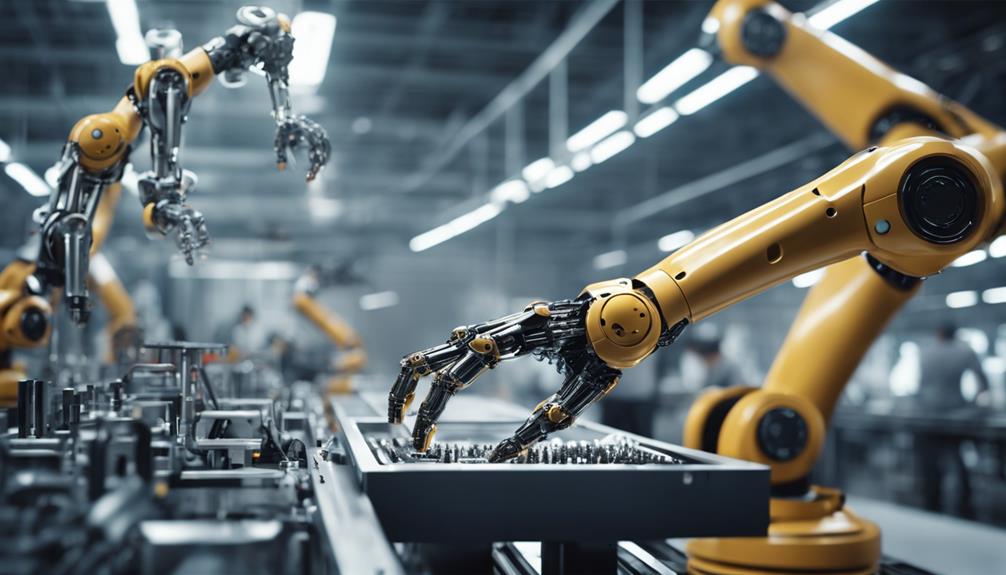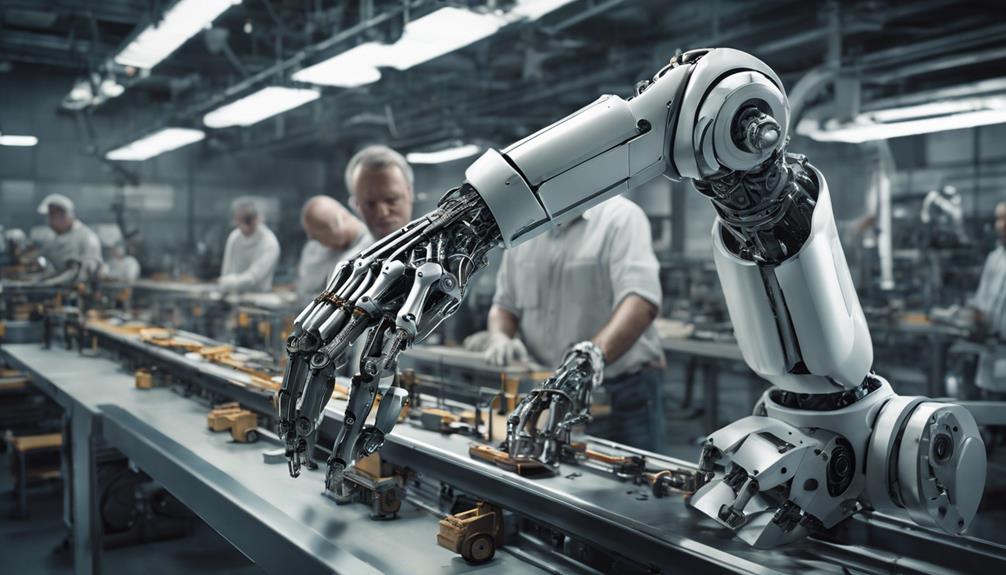Artificial intelligence has undeniably revolutionized the job market, resulting in shifts in traditional employment roles across various industries. The implications of AI on job displacement raise intricate issues that necessitate a thorough examination of its impact on the workforce.
As we navigate this era of automation and technological advancement, understanding the nuances of how AI has replaced many jobs is crucial for professionals seeking to thrive in an evolving job market. This comprehensive guide offers valuable insights into the complex interplay between AI and employment, shedding light on the challenges and opportunities that lie ahead in this transformative era.
Key Takeaways
- AI disrupts job roles in various sectors, threatening 85 million jobs globally.
- Automation in customer service and other sectors leads to job losses.
- Professions like teachers and nurses are less likely to be replaced by AI.
- Lifelong learning and AI specialization are crucial for navigating the evolving job market.
Impact of AI on Various Sectors
The impact of artificial intelligence (AI) on various sectors has led to significant disruptions in traditional job roles, with projections indicating a substantial number of positions may be replaced by AI technology by 2025.
AI's integration into industries like healthcare, agriculture, and manufacturing has already resulted in job losses, with an estimated 85 million jobs globally at risk of being replaced by AI in the near future.
One area where AI is making significant strides is in customer service, where automation and chatbots are increasingly taking over tasks previously handled by human representatives. This shift towards automation in customer service is reshaping the way companies interact with their clients, streamlining processes, and reducing the need for a large workforce dedicated to this function.
As AI technologies continue to advance, more job roles such as customer service representatives, drivers, programmers, analysts, and paralegals are likely to face the threat of automation, leading to further disruptions in the job market.
Jobs Replaced by AI

Given the rapid advancements in artificial intelligence (AI) technology across various sectors, the replacement of human jobs by AI is becoming increasingly prevalent and disruptive. Here are some key roles that have been impacted by AI:
- Customer Service Representatives: AI has replaced these roles through automation and chatbots, handling inquiries more efficiently.
- Car and Truck Drivers: AI-powered autonomous vehicles are replacing human drivers, reducing the need for manual intervention.
- Computer Programmers: The rise of generative AI tools like ChatGPT poses a threat to traditional coding tasks, potentially automating programming roles.
- Research Analysts: AI can efficiently perform tasks such as market research and financial analysis, putting the roles of research analysts at risk.
These examples illustrate how AI, through machine learning and process automation, is reshaping the job landscape, particularly impacting white-collar workers in fields like market research, autonomous vehicles, content marketing, and more.
As AI continues to evolve, workers will need to adapt by developing complementary skills such as soft skills and graphic design to stay relevant in the changing job market.
Jobs AI Will Not Replace
In examining the landscape of jobs impacted by automation and artificial intelligence (AI), certain professions stand out as less susceptible to complete replacement by AI technology. While AI tools are making significant strides in various industries, there are specific roles that are likely to remain less dependent on human replacement.
According to the World Economic Forum, professions like teachers, nurses, therapists, and tradespeople fall into this category. These roles involve a high level of human interaction and complexity that AI currently struggles to replicate effectively.
Additionally, jobs that require creativity and innovation, such as writers and artists, are also less likely to be fully replaced by AI. AI can generate content and art pieces, but the quality and originality that human professionals bring to their work are unmatched.
Furthermore, professions in education and healthcare, which involve intricate tasks and personalized human touch, are expected to remain resilient to complete AI implementation. As AI continues to evolve, these human-centric roles are projected to remain essential, safeguarding millions of jobs worldwide.
Benefits of AI in Workplaces

Enhancing operational efficiency and productivity, artificial intelligence (AI) offers numerous benefits in modern workplaces. Here are some key advantages of AI technology implementation:
- Time-saving Automation: AI saves businesses valuable time by automating repetitive and tedious tasks, allowing employees to focus on more strategic projects.
- Creation of New Job Roles: The development of AI has led to the emergence of new job opportunities such as machine learning engineers and AI ethics specialists, providing avenues for career growth and specialization.
- Crucial Role of Human Workers: Human workers play a vital role in training, monitoring, and maintaining AI systems, highlighting the importance of human oversight in conjunction with AI technology.
- Enhanced Productivity: AI technology redirects human effort towards more productive tasks, leading to productivity enhancements across various job roles and industries while transforming traditional roles to be more efficient and effective.
Strategies for Navigating AI Job Market
The evolution of artificial intelligence (AI) in workplaces necessitates a strategic approach towards navigating the shifting job market, emphasizing the importance of adapting skill sets and embracing continuous learning.
In today's job market influenced by AI advancements, individuals must prioritize lifelong learning and the development of soft skills to stay relevant. Specializing in specific AI-related areas and leveraging everyday technology to stay updated on AI advancements is crucial.
Institutions like Nexford University offer AI specializations to assist individuals in adapting to the changing job landscape shaped by AI integration. Businesses are increasingly utilizing AI to drive efficiency and gain valuable insights for decision-making, highlighting the need for individuals to be agile in learning new skills.
Embracing agile learning strategies is essential for success in an evolving job market heavily influenced by AI, where valuable insights and adaptability play a key role in navigating the changing landscape.
Frequently Asked Questions
How AI Is Replacing Jobs?
AI is replacing jobs through automation and advanced algorithms. Tasks once done by humans, like customer service, driving, coding, and financial analysis, are now being efficiently handled by AI, leading to significant job displacement across various industries.
What Percentage of Jobs Have Been Replaced by Ai?
AI has replaced a significant percentage of jobs globally, with estimates projecting 85 million jobs to vanish by 2025. McKinsey Global Institute further suggests that by 2030, 14% of employees may need to change careers due to AI and digitization.
How Has AI Changed the Role of Work?
AI has revolutionized work roles by automating tasks, enhancing efficiency, and transforming job responsibilities. From customer service to market analysis, AI's impact is profound. While some fear job displacement, AI also creates new opportunities for skill development and innovation.
Will AI Create More Jobs Than It Destroys?
AI is projected to create more jobs than it displaces. Industry reports and economic forecasts suggest that AI will lead to a net gain in jobs globally. Emerging roles in AI technology and related fields further indicate the potential for job creation.
Conclusion
In conclusion, the integration of artificial intelligence has significantly impacted various industries by automating tasks and processes traditionally performed by humans.
While some jobs have been replaced by AI, new opportunities have also emerged, requiring individuals to adapt to the changing job market.
As we navigate the evolving employment landscape influenced by AI, one must wonder: How can we continue to thrive in a world where technology continues to advance at a rapid pace?









